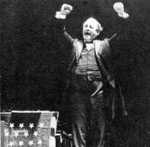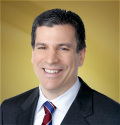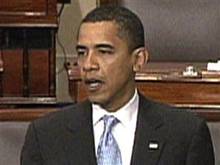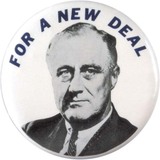Think of this as Volume 11, Number 40 of A-Clue.com, the online newsletter I’ve written since 1997. Enjoy.
The most telling fact of the last week is that Wall Street and big business advocates have been forced to re-think their knee-jerk support of the Republican Party.
That’s because, in its embrace of its Church Street wing, the GOP has had to eat increased amounts of Populism to stay in power. Populism forced the party to end its Bush-Dole feud in 1988 in order to pivot against Pat Robertson. Populism was let into power only because Bush the Lesser was a Bush, and thus it was assumed he would not crash the ambulance through populist tendencies.
But Bush did crash the ambulance. Wall Street lost some of its enthusiasm, but remained strong enough to see John McCain to victory over Mike Huckabee.
Then came Palin. And the bailout bill.
Sarah Palin was put on the ticket because she could bring the Populist wing of the Republican Party enthusiastically on board. Regardless of what you feel about her personally, her political personality is right out of the William Jennings Bryan playbook. Small town, producers of basic goods (oil and moose), church-going people with a thick streak of bigotry.
When kids are taught American history, they’re taught about the rise of Jefferson, which was essentially Populist, and the Party of Jackson, which was also Populist. By that I mean they were distrustful of big institutions, big businesses and government authority. They may even be taught that, in the run-up to the Civil War, the North represented manufacturers and the South farmers.
Here is what they are not taught.
Since 1860 Populism has been the losing card in American politics. Wall Street was Republican through the age of FDR, switched to support Democrats during the New Deal and World War II, then gradually fell back to the Republicans, who have now been the majority party for a generation.
The most important political event of the year may have been Monday’s House vote on the bailout bill. House Republicans, taking a cue from their Populist constituents, went against the bill 2-1. They lied to their leaders, who then lied to the Democrats. The deal Wall Street needed could not get done.
The reaction, on CNBC, was shock, apoplexy, followed by all the stages of grief. The anchors there are as Republican as those at Fox News, albeit without the populist sugar coating. So are their guests. Neither could believe that their party had deserted them, that the people they put into power were calling them names.
Even on the vote last night which resurrected the bill, 14 of the 25 no votes came from Republicans. The party’s standard-bearer, Sen. McCain, did vote the "right" way, but grudgingly. Many on Wall Street saw his grandstanding of the previous week as scuttling a deal as it was being done, and he refused to explain himself when given a chance in debate.
By contrast, Barack Obama delivered a 13-minute speech supporting the bill. It may have been the most important speech of the year so far. In it he set terms by which the Democratic Party will support Wall Street’s interests, not just now but in the future:
I do not think this is going to be easy. It’s not going to come without costs.
We are all going to need to sacrifice. We’re all going to need to pull our
weight. Because now, more than ever, we are all in this together.That’s part of
what this crisis has taught us, that at the end of the day, there’s no real
separation between Wall Street and Main Street. There’s only the road we’re
traveling on as Americans. And we will rise or fall on that journey as one
nation and as one people.I know that many Americans are feeling anxiety right
now about their jobs, about their homes, about their life savings. But I also
know this. That we can steer ourselves out of this crisis. We always have.During the great financial crisis of the last century, in his first fireside
chat, F.D.R. told his fellow Americans that, "There is an element in the
readjustment of our financial system more important than currency, more
important than gold and that is the confidence of the people themselves.
Confidence and courage are the essentials of success in carrying out our plan.
Let us unite in banishing fear. Today we cannot fail. We cannot fail — not now,
not tomorrow, not next year.This is a nation that’s faced down war and depression, great challenges and
great threats. And at each and every moment, we have risen up to meet these
challenges. Not as Democrats, not as Republicans but as Americans with resolve
and with confidence. With that fundamental belief that here in America, our
destiny is not written for us, it’s written by us. That’s who we are and that’s
the country I know we can be right now.
Notice the terms he is laying down. I boldfaced them. Wall Street must work for Main Street. Americans must work together, not work against one another. And note how he clinched the deal with a quote from F.D.R.
Republicans have never accepted this, not then and not now, but history records that Franklin D. Roosevelt saved capitalism. In the depths of the Depression extremism was on the march, Communism on the left and Fascism on the right. Not just in Europe, but in America as well, poor people were marching against the very concept of profit, and rich people were listening to the siren song of tyranny.
Republicans accepted Roosevelt and prospered. Under Democratic rule the modern American middle class was born. The middle class may be progressive or conservative, but Populism is not its movement, even when many who call themselves middle class indulge in it. Because Populism, like so many other -isms, does not in the end tolerate dissent. Not from its economic strictures, not from its social norms, and not from what its members consider to be God’s law.
When Obama gave Wall Street Franklin Roosevelt, and brought his party to the table, he settled the issue of this year’s election. And he gave the Democratic Party an opportunity, one it has had only twice before in its history (the first time was with Grover Cleveland), to build a governing myth that can last a generation.
What is that myth?
It’s the Internet Thesis of Consensus which holds, simply, that we are all in this together. We must find where we agree and work out from there. We must accept one another, respect one another, work with one another. We must hang together or we will surely hang separately.
















Vytorin.
Vytorin symptoms. Side effects vytorin. Vytorin.